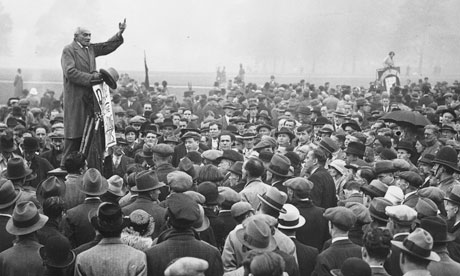« November 2013 | Main | January 2014 »
December 26, 2013
Rule 2: Customers and Clients are the Main Event--not you, your employees or your profession.*

Western professionals talking shop.
Rule Two: The Client is the Main Event.
We all know that clients pay our fees, give us interesting work, and that we have professional, financial and fiduciary duties to clients. We tell clients they are "everything" to us. But is it true? Is the notion that the client is the main deal chiefly something we eagerly tell our clients (and ourselves) while we pitch for work? My sense is that lawyers, except on a strictly marketing and PR level, and even with the best clients, generally forget that and won't create what quality improvement guru W. Edwards Deming years ago called a "constancy of purpose" about true service.
So Rule Two becomes the obvious "yeah-of-course-our-firm-knows/does that" rule that may get more lip service than actual delivery in all the details of our work for clients. If client (or customer) "primacy" were really the organizing principle for everything we do, isn't that in our interest, too? Doesn't that mean that the work is better, law firm staff and attorneys are pulling in the same direction, morale is good, we spend less time and money on marketing, we keep good clients and we attract new ones?
And if we really get it, are really we doing it?
*Is there anything more myopic or prissy than lawyers who constantly talk about the "integrity of the Profession"? Suggestion: Start with customers; build your integrity from there.
Posted by JD Hull at 02:36 PM | Comments (0)
December 25, 2013
Merry Clayton To All.
Posted by JD Hull at 11:53 PM | Comments (0)
December 24, 2013
Cyber-Speakers' Corner: "Merry Christmas, Ya' Bastards."

Three Decembers ago on a Sunday, I did hear this holiday greeting from a guy in the Northeast corner of Hyde Park when he felt his entreaties to about 20 people to help him start a new UK political party had fallen upon unsympathetic ears. No one bought his idea... But he was fair and honest, as was his audience, and of course hilarious. But West London's Speakers' Corner is generally lot more civilized, fair and regulated than Cyber Corner, a/k/a the Internet. We still need some rules. One holiday wish we have for you on the Net in 2014:
(1) Don't let anyone tell you What to Say/Write.
(2) Don't let anyone tell you NOT What to Say/Write.
(3) Think your own thoughts. Avoid Lemming-Think.
(4) Check your facts. Carefully.
(5) Don't purposely misrepresent the views, or speculate about the motives, of others.
(6) Be aggressive--but try to have some class.
Merry Christmas, Folks.
Posted by JD Hull at 11:17 PM | Comments (0)
December 21, 2013
Solstice: For Our Druid Friends.

Posted by JD Hull at 12:00 AM | Comments (0)
December 20, 2013
Think like a client. The trick now is to win cheap.
For an experienced client, the cost of the lawsuit is part of the "victory" analysis. So is closure--or just getting it over with.
In America, the state and federal trial courts of record--rather than arbitration panels or mediation (which we Americans group together under the heading Alternative Dispute Resolution, or "ADR")--are still the "poison of choice" to resolve commercial disputes. That is likely to be true for a long time.
True, also, that our courts in the U.S. give even civil litigants (a) due process rights, (b) pre-trial access to the discovery of evidence, and (c) opportunities to present evidence at trial--each on a scale the world has never known before. While that "experience" is often tainted with inefficiencies and waste, it is at least predictable. Litigants generally accept the risks of what can happen to them--through flukes, brilliance, or the triumph of moral order in the universe--in American courts.
However, the "bad news" here is also considerable--and, of course, predictable. Business litigation in the courts is (a) extremely expensive, (b) highly disruptive to clients reps and witnesses, many of whom are managers or workers, and (c) very lengthy from start to finish. Even the "winning" client generally loses--and loses a lot in terms of resources and time.

However, our enduring global recession (or "new normal", perhaps) is certainly a good time for business clients to push for ADR (including mediation) over litigation. Not because ADR is cheaper, faster and better; often it's clearly not advantageous in any of those three ways.
It's simply because the cases you defend in struggling economic times can be more marginal from a merits standpoint. And that's exactly where ADR can really help. Even if you don't love ADR in America, or you were trained for full-blown trials.
Say you've just been handed a case to defend in an American court that is poorly-grounded, weak or otherwise insubstantial. A weak employment discrimination or wrongful discharge action (I call it the the "un-classy firing" suit). Or a flimsy business case dressed up as an unfair competition or infringement action (the "it's-weak-but-let's-see-what-happens" suit). Down-on-their-luck David & Son, with hungry counsel, v. Flatfooted Goliath, Inc., your client and a deep pocket.
The stars seem to be aligned in Goliath's favor.
Not only does your client Goliath have more resources, and the case filed against it is transparently contrived and weak, you are assigned to a real judge. Your firm is before a scholarly, honest, sane jurist with people sense, and loved by all. Your research suggests that the judge is business-savvy in rulings, and takes a dim view of iffy cases.
So you think you will win your case on a dispositive motion (and you do, eventually). You are right on the merits--and any law professor in the U.S. would agree with you. The "case" your long-time GC just handed you is silly, right? And a piece of cake. A cinch. Almost beneath you, you tell yourself. An "easy win", right?
Well, think again, Skippy.
Your GC couldn't have hired you to do anything more difficult. "Winning" just took on a new and more complicated meaning. Because now--especially if you were just handed a defense counsel's dream and stone "winner" of a case--you will have to work harder, and be smarter, than if you were defending a good faith or meritorious suit in which your client had the lion's share of bad facts.
The trick now is to win cheap*. An easy-to-win business suit handled by the most efficient defense counsel on earth can have defense fees and costs well over $100,000, even with minimal or no discovery. You really think that your GC or client rep will be happy the day you tell him or her about your great win on all counts based on your brilliant Rule 12(b)(6) or Rule 56 motion?
Don't bet on it. For the experienced client, the cost of the lawsuit is part of the "victory" analysis. So is "closure"--or just getting it over with. In a down American economy, litigation tends to increase. More suits are filed. And in my view clients and their plaintiff's lawyers file more questionable suits, i.e., ranging from Rule 11 violations and frivolous to iffy and wasteful. Employee and business nuisance cases are a big chunk of those filings.
A good arbitration panel or mediator will cut to the quality of the suit and its likelihood of success quicker than even the best American judges, who often feel obligated to give bad and iffy cases a wide berth. And good judges understand the problems of the business community and the utility of arbitration and mediation. Get jurists on your side in your attempt to drive iffy cases into ADR.
*Better to have "no lawsuit" than a great case or defense.
Posted by JD Hull at 12:00 AM | Comments (0)
December 10, 2013
CPR's Global Accelerated Arbitration Rules.
Choose to use them. They're aggressive and "get-it-done", in both letter and spirit. Global Rules For Accelerated Commercial Arbitration, of the CPR Institute. Best two features: (1) The default position is a sole (one) arbitrator. (2) Arbitrators should make award ASAP and in any event within six months of formation of the tribunal.
![CPRLogo[1].gif](http://www.whataboutclients.com/archives/CPRLogo[1].gif)
Posted by JD Hull at 11:59 PM | Comments (0)
Time to Wake Up, Campers: New Haven, 1967.
Posted by JD Hull at 04:39 PM | Comments (0)
December 03, 2013
How do you get more work from GCs and in-house counsel at great companies?
It's hard yet not complicated. You ask them. You pick up the phone and ask for more work. Or, in some cases, you e-mail. You persist--but do it all with taste and sensitivity to their schedules and burdens. Try not to be a dork.

"Zen Master", by Chen Jun (1935-), 2003.
Posted by JD Hull at 11:59 PM | Comments (0)